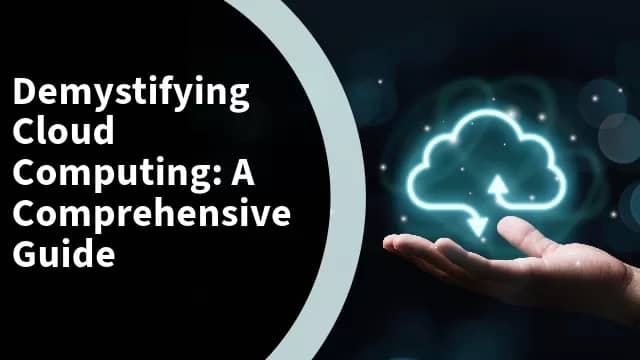Introduction
In today’s digital age, cloud computing has become a fundamental pillar of modern technology. The term “cloud computing” is ubiquitous, but what does it really mean? How does it work, and why is it so essential? This comprehensive guide aims to demystify cloud computing, providing you with in-depth insights, real-world examples, and answers to common questions. By the end, you’ll have a clear understanding of this transformative technology.
What is Cloud Computing?
Cloud computing refers to the delivery of computing services—such as storage, processing, and networking—over the internet. Instead of relying on local servers or personal devices, cloud computing harnesses the power of remote data centers. Here are some key aspects:
- Scalability: Cloud services can scale up or down based on demand, ensuring optimal resource utilization.
- Accessibility: Access your data and applications from anywhere with an internet connection.
- Cost-Efficiency: Pay only for the resources you use, eliminating the need for expensive infrastructure.
Types of Cloud Computing
Demystifying cloud computing involves understanding its various models:
1. Infrastructure as a Service (IaaS)
IaaS provides virtualized computing resources over the internet. Users can rent servers, storage, and networking components.
2. Platform as a Service (PaaS)
PaaS offers a platform for developers to build, deploy, and manage applications. It abstracts infrastructure complexities, allowing focus on code.
3. Software as a Service (SaaS)
SaaS delivers software applications through the cloud. Users can access them via web browsers, eliminating the need for installations.
4. Functions as a Service (FaaS)
FaaS, also known as serverless computing, enables the execution of code in response to events, automatically managing the infrastructure.
Benefits of Cloud Computing
Why has cloud computing gained immense popularity? Let’s explore its benefits:
- Cost Savings: No need for upfront infrastructure investments.
- Flexibility: Easily adapt to changing business needs.
- Scalability: Scale resources as your business grows.
- Reliability: High uptime and data redundancy.
- Security: Advanced security measures and compliance standards.
- Global Reach: Reach customers and markets worldwide.
- Collaboration: Enable seamless collaboration among remote teams.
Industries Transformed by Cloud Computing
Cloud computing transcends industries, revolutionizing operations and driving innovation:
1. Healthcare
Electronic health records, telemedicine, and medical research benefit from secure cloud storage and processing.
2. Finance
Banks rely on cloud computing for data analysis, fraud detection, and customer service.
3. Education
Cloud-based learning platforms provide accessible education to students globally.
4. E-commerce
Retailers use cloud services to manage websites, inventory, and customer data.
5. Entertainment
Streaming services deliver content worldwide, powered by cloud infrastructure.
The Role of LSI Keywords in SEO
LSI (Latent Semantic Indexing) keywords enhance SEO by considering semantically related terms. For instance, in our discussion of cloud computing, LSI keywords might include “cloud technology,” “data security,” and “cloud service providers.” Incorporating these terms naturally can boost your search engine ranking.
FAQs
Q: Is cloud computing safe for storing sensitive data?
Absolutely. Leading cloud providers invest heavily in security measures, encryption, and compliance with industry standards. Your data is often safer in the cloud than on local servers.
Q: How do I choose the right cloud service provider?
Consider factors like your specific needs, budget, and the provider’s reputation. Major players like AWS, Google Cloud, and Microsoft Azure offer comprehensive solutions.
Q: Can small businesses benefit from cloud computing?
Certainly. Cloud services are scalable and cost-effective, making them ideal for startups and small businesses looking to grow without hefty infrastructure costs.
Q: What’s the future of cloud computing?
The future promises even more innovation, with advancements in AI, IoT, and edge computing driving cloud technology forward.
Q: Are there any risks associated with cloud computing?
While generally secure, cloud computing can pose risks if not managed properly. It’s crucial to understand and address these risks, including data breaches and compliance issues.
Q: How can I migrate my existing applications to the cloud?
Migrating to the cloud requires careful planning and execution. Consult with cloud experts or follow step-by-step guides provided by your chosen cloud provider.
Conclusion
Demystifying cloud computing reveals its transformative power across industries. Its cost-efficiency, scalability, and accessibility make it a vital component of the digital age. As technology continues to evolve, understanding cloud computing is not just an option but a necessity for individuals and businesses alike.

